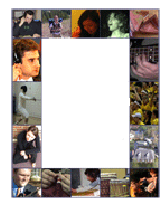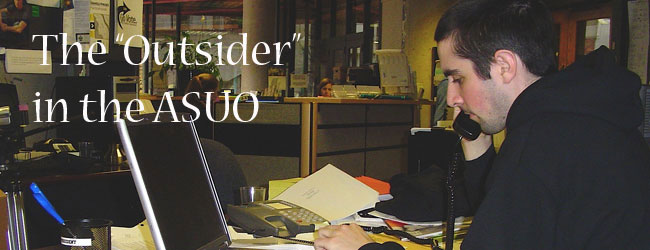
Sports
- The Outdoor Program helps people plan adventures.
- Adam Lake uses fencing to bring people together.
- Win or lose, the Pit Crew keeps Mac Court shaking for the Ducks.
- Tearing at jerseys and slamming into each other. It's women's rugby.
Changes
- A Taiwanese student finds adjusting to a foreign culture challenging.
- A close-up look at the ASUO president.
- A senior's abrupt transition to Eugene after Hurricane Katrina.
Arts
- A ballroom dance club president wears many hats and makes them too.
- Whether composing or jamming on his mandolin, Jesse Jones shares his love of music.
- Non-traditional African dance brings a new sense of community.
- The Student Fibers Guild proves that knitting isn't just for old ladies anymore.
- Halo Jones' music and art expresses his dark and light sides.
- A musician, student, activist and artist.
- For Ashley Maury, jewelry is more than decorative.
- A student TV show features news, sports, drama and comedy.
- A printmaking student goes beyond the studio and into the city.

Walsh says creating rollover meal points was accomplished during the fall quarter, but it didn’t exactly happen the way he had envisioned. It was something that they started on during the summer, and then the Residence Hall Association took control of it. Walsh says even though he and Coy didn’t really accomplish the roll-over meal points themselves, he believes that he brought attention to the issue and applied pressure to get it done. Walsh says he was pleased that it was accomplished and has always thought it was the fair thing to do because students shouldn't lose something that they pay for.

In the past, Hamilton's Grab N' Go would get lots of traffic late Saturday night, but roll-over meal points helps alleviate this problem. |
Walsh says he has just started working to bridge the gap between University and the community. One way he hoped to do this was to connect the Eugene Chamber of Commerce with the Career Center on campus, so that local businesses have access to students looking for jobs. He says it has been difficult because only recently has he had the opportunity to start working on this project. The ASUO executives always have other responsibilities at the outset that push back their plans.
“It seems like no matter what you campaign on, you’re not going to be able to work on it for the first eight or nine months of your one-year term,” says Walsh. “That gives you a little time to pull things together. I think that is what has happened to us and our connections to the community.”
Walsh says his most successful platform issue has been slowing the growth of the incidental fee. He says he knew that the potential for growth of the fee, currently at $191 per term, this year would be huge because classified staff wages would unfreeze after a few years of stagnation. Walsh says he definitely supported the wage increases, but acknowledged that it affected this year’s budget in ways unlike prior years. He says the process of curbing growth in the fee needed to start now so it didn’t affect programs later down the road. Walsh says the fee will probably rise to about $200 per term. He says the success of his goal can be argued, but he says he has been successful, especially in such a tough fiscal year.
“I think the most important thing that we ran on was the incidental fee and working to keep it to low growth, and that definitely is something we’ve accomplished,” says Walsh. “I think that’s a big thing, making sure that we’re not shortsighted and just looking at the bottom line this year, but how that bottom line affects next year and 10 years down that road.”
Walsh says he has faced other obstacles this year, such as troubles with the Designated Driver Shuttle program. He also sits on the Executive Diversity Working Group, which is helping craft a Five-Year Diversity Plan for the University that will act as a model for colleges and departments on campus. The most difficult thing, he says, is trying to balance all of the work with school and his other job at the University recreation center, which can keep him on campus all day long.

Walsh and Kyla Coy listen to Richard Pryor (far left) talk about the progress of the Spring Street Fair planning. |
“The time commitment is just insane,” says Walsh. “I’ve never been this busy before in my life. It’s draining. That’s probably the worst part, how long the day can be. If I’m not in a class then I’m in a meeting back-to-back-to-back from 8 or 9 [in the morning] until 7 at night.”
While his position requires a lot of time, Walsh says he really enjoys his job because it isn’t all paper work. A lot of it is problem-solving.
“I think that has been the most rewarding part is just being able to sit down and make decisions, give directions and solve problems as they arise,” says Walsh. “… Solve the problem and come up with realistic solutions.”
He says the most enjoyable and challenging thing has been doing that while trying to maintain the principles that got him and Coy elected because every problem is different.
|
“If there was a motto to our administration, at least for Kyla and I, it would be policy based on principle,” says Walsh. “It’s not willy-nilly. It’s not this feels right or doesn’t feel right; there is actually solid evidence to support the decisions that we make.”
Walsh hopes whoever is in office next would not only follow the same principle but also see how their administration affects the future.
As for the future, Walsh says he is hoping to work in Washington, D.C., or Salem on a legislator’s staff and continue policy work. This is where he really sees himself.
“I really enjoy policy and problem solving,” says Walsh. “I feel that somewhere inside of politics would be someplace for me. Although that is not set in stone, and I’m up for anything anybody has to offer. But nothing interests me more than politics.”
